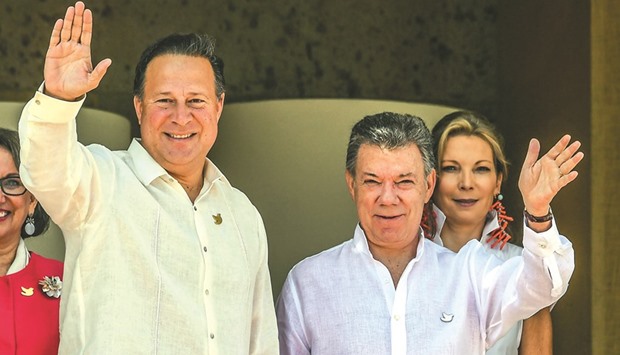Venezuela’s political crisis and Colombia’s stuttering peace process looked certain to dominate the Ibero-American Summit today rather than an official agenda about youth, entrepreneurship and education.
Amid a swing to the political right around the region, Peru’s president and former investment banker Pedro Pablo Kuczynski was leading calls to put Venezuela at the top of the agenda.
The oil-rich country’s socialist government is facing an escalation of opposition protests after electoral authorities suspended a referendum on President Nicolas Maduro’s rule.
Maduro, 53, who narrowly won election to succeed Hugo Chavez in 2013, has been facing political challenges because of the deep economic crisis.
He was due to attend the summit briefly on Saturday, organisers and a Venezuelan government source said.
Heads of state and officials from around Latin America, as well as Portugal and Spain, were attending the meeting in the coastal humidity of colonial Cartagena and were due to release a statement later yesterday.
Venezuela, despite having the world’s largest oil reserves, is mired in a prolonged recession worsened by currency depreciation and low oil prices.
Critics say Maduro has kept a grip on power by side-lining the legislature. But he says foes are seeking to topple him illegally.
The summit’s host Colombia, meanwhile, is scrambling to save a hard-won peace deal with the Revolutionary Armed Forces of Colombia, or Farc.
The deal, hammered out over almost four years of difficult negotiations, was rejected in a plebiscite vote this month by less than half a percentage point.
The regional leaders met at the same conference centre where the deal was signed just over a month ago.
President Juan Manuel Santos, who was re-elected in 2014 on a platform focused on achieving peace, has held meetings with the opposition in a bid to modify the deal enough to satisfy critics.
“Peace for Colombia will be a reality,” Santos said in opening remarks at the conference.
“We will not betray the hopes of Colombians or the international community, which has accompanied us with such generosity.”
Government negotiators have returned to Havana, Cuba, where the original talks took place, to discuss opposition suggestions with Farc leadership and make changes to the accord.
Leaders at the summit have repeatedly expressed their support for the peace process, which would end 52 years of war that have killed nearly a quarter of a million people.

Panama’s President Juan Carlos Varela and Colombian President Juan Manuel Santos wave as Colombian first lady Maria Clemencia Rodriguez looks on during a welcome ceremony during the XXV Ibero-American Summit in Cartagena, Colombia.
